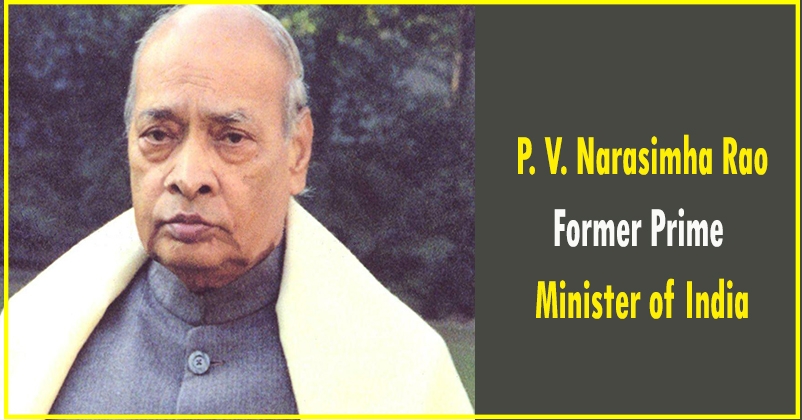22 Feb, 1994- When Narsimha Rao stood like a STATESMAN against Pakistan and got support all across party leaderships
| 22-Feb-2019 |

The entire state of Jammu and Kashmir is an integral part of India is the truth written in preamble and section-3 of the Constitution of Jammu and Kashmir. It is also evident that India went to UN against the aggression of Pakistan on Jammu and Kashmir and again reiterated India’s position in the State of Jammu and Kashmir by the representative of India to UN Mr. V.K. Krishna Menon. After that in 1963, India claimed its right on Pakistan Occupied Jammu and Kashmir (POJK) when Pakistan ceded Shakshgam valley to China illegally. Later in 1994 India decisively claimed its rights on the entire state of Jammu and Kashmir. Ironically, no Government paid heed towards the strategically important State of Jammu and Kashmir and not much efforts were found to be taken to take the areas of Jammu and Kashmir under the illegal occupation of Pakistan.
PV Narasimha Rao earned the tag of ‘Chanakya’ because of his decision on Jammu and Kashmir
The then Pakistan Prime Minister extended her full support to the terrorists, who were fighting in Kashmir during 1990s. Pakistani parliament passed a resolution which rejected the Jammu and Kashmir's accession to India on 9th February, 1990 and even demanded the implementation of UN resolution. Though Rao tried to use diplomatic channels to discuss Kashmir issue with the then PM of Pakistan Benazir Bhutto yet Pakistan internationalized the issue. Bhutto declared her full support to terrorists. Even US tried to deflect the attention of international community from POJK.
The New Delhi was alarmed when in May 1993 John Malott of US State Department followed by Robin Raphael visited India and started speaking the language of Pakistan on the issue of Kashmir. The US President in his UN General Assembly address on September 1993 did not mention the issue of POJK. It was an international coup to dislodge the Indian government from Kashmir. The Organisation of Islamic Countries (OIC) too joined the chorus and began seeking visas to send a fact-finding mission to Kashmir.
Rao was not remaining a mute spectator and to counter the Pakistan’s resolution on Kashmir, the Indian parliament unanimously passed Kashmir Resolution on 22 February 1994.
Parliament resolution on 22 February 1994 Since, the Instrument of Accession, which was later ratified by the Constituent Assembly, was the only instrument used by any of the princely states that acceded to India the entire Jammu and Kashmir belongs to India only. This same thing was reiterated by the Parliament of India in its 22nd February, 1994 resolution. In this resolution the Parliament condemned the support of Pakistan to terrorists and using Pakistan Occupied Jammu and Kashmir (POJK) for training and infiltration of terrorists in India. It called upon Pakistan to stop supporting terrorism. In this resolution Parliament of India mentioned “On behalf of the People of India, Firmly declares that-
(a) The State of Jammu & Kashmir has been, is and shall be an integral part of India and any attempts to separate it from the rest of the country will be resisted by all necessary means;
(b) India has the will and capacity to firmly counter all designs against its unity, sovereignty and territorial integrity; and demands that -
(c) Pakistan must vacate the areas of the Indian State of Jammu and Kashmir, which they have occupied through aggression; and resolves that -
(d) all attempts to interfere in the internal affairs of India will be met resolutely”. The Resolution was unanimously adopted and got unanimously passed.
Rao kept national interest above party politics
Pakistan moved to UN Human Rights Commission on 27 February 1994 and tabled the resolution through OIC to condemned India for violation of human rights in Kashmir in Geneva. If the resolution would have passed, India would have been put on UNSC economic sanctions. Rao was one of the finest statesmen, who kept the national interest above the party politics. He sent a team, which is also inclusive of opposition leaders in it, to UN. The team was inclusive of Atal Bihari Vajpayee, then opposition party leader, Salman Khurshid, E. Ahmad, National Conference head Farooq Abdullah and Hamid Ansari, Finance Minister Manmohan Singh was also sent to represent India at Geneva. Such statesmanship and spirit are rarely seen in politicians today. The masterstroke of including Muslim delegates was later turned out to be effective in dismantling the claims of oppression of Kashmiri Muslims in India. The diplomatic channels and approach to other countries has helped in garnering the support of other countries and proved a game changer. Indonesia and Libya withdrew its support to OIC resolution, Syria and Iran said they wanted to reconsider the revised draft and China also withdrew its support. These developments forced Pakistan to withdraw its resolution on Kashmir from UN.
Tags: